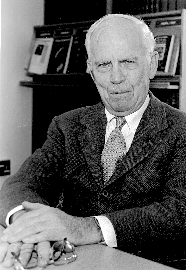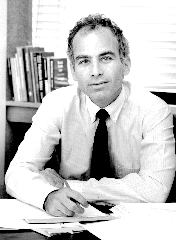
 Head honcho
Head honcho
Brain research has come a long way since Vernon Mountcastle
began his pioneering work during the 1950s.
Advances in diagnostic imaging techniques alone
have brought vast improvements to clinical medicine, says
Mountcastle, who will be honored next week by the National
Academy of Sciences for his lifetime of work in the
neurosciences.
"You can see the brain, in three dimensions,"
Mountcastle says. "It's so dramatic. You can follow the blood
flow and you can determine whether there are lesions in vessels
or lesions in the brain. It's a whole new world."
Full story...
 Expert on privacy looks at medical
information
Expert on privacy looks at medical
information
A lone hacker saddles up to his computer, cracks his knuckles and
begins to hammer away at the keyboard. With his agile mind in
full code-breaking mode, the intruder maneuvers his way through
all system defenses and sidesteps all passwords, until ultimately
the hard drive of a computer located miles away gives way and
greets this unwanted visitor with a "Welcome."
With a few quick key strokes, rushes of
information suddenly cascade down the screen: name, date of
birth, complications of pregnancy, details of an appendectomy at
age 12, plastic surgery to repair the subject's ear, signs of
possible alcoholism, recurring visits to an out-of-town
therapist. The data flows endlessly. The hacker then downloads
the information, leans back in his chair and smiles at his
success.
What's even more frightening about this
scenario is that in the not-so-distant future accessing this
information could be legal--and it might be your future employer
or insurance company sitting at the keyboard.
Full story...
| [ The Gazette | Search Gazette Archives | About the Gazette | Send us Email ] |
The Gazette
 The Johns Hopkins University
The Johns Hopkins University
 Suite 100
Suite 100

3003 North Charles Street
 Baltimore, Maryland 21218
Baltimore, Maryland 21218
 (410) 516-8514
(410) 516-8514  gazette@resource.ca.jhu.edu.
gazette@resource.ca.jhu.edu.
